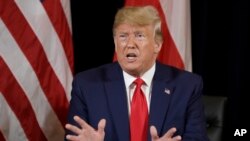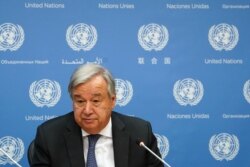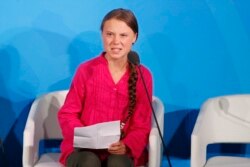U.S. President Donald Trump has long opposed globalism and criticized the multilateralism that is the foundation of the United Nations. However, as the leader of the country that hosts the world body, Trump is obligated to attend and speak to the U.N.'s General Assembly every year, which he did for the third time on Tuesday.
"If you want freedom, take pride in your country. If you want democracy, hold on to your sovereignty. If you want peace, love your nation," Trump in his address.
He had harsh words concerning Iran, saying all nations have a duty act to against the Islamic Republic. "No responsible government should subsidize Iran's bloodlust," he said.
In a joint statement issued Monday, Britain, France and Germany declared that Iran is responsible for recent attacks on Saudi oil facilities. They join the United States, which has instituted new economic sanctions against Iran in response to the attacks.
Iran has denied responsibility, and on Monday Foreign Minister Mohammad Javad Zarif called on European signatories to the 2015 agreement regarding Iran's nuclear program to forge an "independent path" from the United States and help Iran work around U.S. sanctions.
U.S. and Iranian officials have said their two leaders are not going to meet this week during the U.N. events, but some diplomats are holding out hope there could be an encounter to try to slightly thaw the chill amid increasing talk of war.
'America's leadership'
During the address, the U.S. president is expected to "affirm America's leadership" and "underscore that America is a positive alternative to authoritarianism," according to a senior administration official.
During last year's address to the General Assembly, Trump drew laughter when he boasted that his administration "accomplished more than almost any administration in the history of our country."
In a survey, former U.S. ambassadors and top-level national security officials from both Republican and Democratic administrations said they believe U.S. influence on the world stage has declined during Trump's time in office while the country's adversaries have grown stronger.
Trump is also holding one-on-one meetings this week with some of the visiting heads of government, as well as attending at least one diplomatic reception and a lunch hosted by U.N. Secretary General Antonio Guterres.
In his first formal remarks of the week on Monday, Trump spoke at an event — the "Global Call to Protect Religious Freedom at the United Nations" — that he and Vice President Mike Pence hosted.
Trump said protecting religious freedom is one of his administration's highest priorities.
"Approximately 80% of the world's population live in countries where religious liberty is threatened, restricted, or even banned," Trump said in his speech.
"Today, with one clear voice, the United States of America calls upon the nations of the world to end religious persecution," he added to applause.
Trump, whose administration has been criticized for closing the door to an increasing number of people claiming asylum from persecution in their home countries, said the United States "will always be a voice for victims of religious persecution everywhere. No matter where you go, you have a place in the United States of America."
The most closely watched event on the U.N.'s Monday calendar, however, was the Climate Action Summit where Trump made a brief unscheduled appearance.
The president spent less than 15 minutes at the event and did not speak. He listened to addresses by Indian Prime Minister Narendra Modi and German Chancellor Angela Merkel before departing when Chilean President Sebastian Pinera began speaking.
Asked later why he attended the meeting, Trump replied, "Because I believe in clean air and clean water. Very simple. We have the cleanest air. We have the cleanest water, cleaner than it's ever been before in our country."
Trump arrived after teen climate activist Greta Thunberg of Sweden opened the summit, telling the world leaders, “We are in the beginning of a mass extinction and all you can talk about is money and fairy tales of eternal economic growth. How dare you.”
Modi and Khan
Monday afternoon, Trump sat down with Pakistani Prime Minister Imran Khan — a day after the U.S. president attended a huge rally for the Indian American community alongside Indian Prime Minister Modi in a Houston, Texas, stadium.
The event, in which Modi defended his government's annexation of Kashmir, a territory disputed with Pakistan, was seen as a de facto endorsement by Trump of India's stance.
After their speeches, Modi took Trump's hand and they circled the stadium, as tens of thousands of Indian Americans cheered.
The scene bristled Pakistanis, and reporters accompanying Khan peppered Trump with questions about it on Monday.
The U.S. president reiterated his offer to try to settle the long-standing Kashmir territorial dispute between the two neighbors.
"I'm ready, willing and able," said Trump. "I've never failed as an arbitrator."
Trump added he hopes the two countries will come together and do something "that's really smart."
In the meeting with Khan, Trump lavished praise on India's rival.
"I trust this gentleman right here, and I do trust Pakistan," he said.
Sideline meeting
On the sidelines of the U.N. General Assembly, Trump met South Korean President Moon Jae-in to discuss how to further reduce tension on the Korean peninsula caused by Pyongyang’s nuclear and ballistic missile programs.
Moon told Trump he hoped a third summit between the U.S. president and North Korea’s leader, Kim Jong Un, would lead to something “truly historic” and transform the Korean peninsula.
“People would like to see that happen,” responded Trump.







